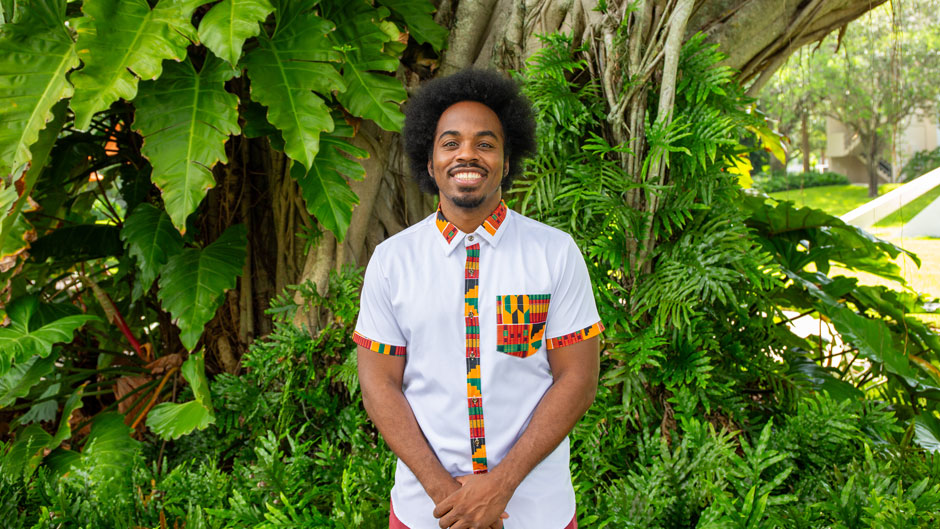On the first day of his Psychology of Racism class, Simon Howard hands each student an envelope with their name written on it. Inside is an invitation to join a “brave space.”
“I’m really adamant about creating that brave space because it fosters an environment where individuals feel empowered to share their authentic selves, engage in open dialogue, and confront challenging issues,” said Howard, an assistant professor in the Department of Psychology at the University of Miami College of Arts and Sciences. “I think that’s difficult to do with a topic such as racism, given that we don’t typically talk about racism in society and here we are in a room full of strangers for three months talking about things people don’t want to talk about or have been taught or told not to talk about.”
Howard, who recently won a Provost’s Teaching Award for Discussion-Based Learning, is not one to shy away from challenging topics.
He is the director of the Psychology of Racism, Identity, Diversity, and Equity (PRIDE) Lab, which conducts research on racism, as well as stereotyping and prejudice related to other dimensions of identity, such as gender and sexual orientation.
“I want the work I’m doing to inform our understanding of the underlying psychological processes of racism and have some real-world impact and implications,” Howard said.
The letter inviting students to a “brave space” isn’t the only thing that sets Howard’s classes apart.
In the Psychology of Racism course, students record videos of themselves responding to readings and class discussion topics—an activity akin to creating a video blog. In one of the first classes, they also play a modified game of Monopoly in which each player is assigned a special set of rules that represent systemic barriers in society based on race. Some players start the game with several properties and twice as much money as specified in the regular rules, for example, while others begin with half the normal amount and no properties. The players who begin the game with half the money are only allowed to use one die, while others are allowed to use both. After playing with the modified rules for 20 to 30 minutes, the rules are set back to normal. Students quickly see how the past systemic barriers affect their current game. “It’s a metaphor for how racism of the past impacts the present day,” Howard explained.
Adriana Novello, a senior double majoring in psychology and music therapy who took the course last fall, said Howard’s teaching style prompted students to think deeply about the material. “We had the opportunity to really talk through the concepts we were learning,” she said.
Helping students to think critically is one of Howard’s goals. In discussion-based courses, like the Psychology of Racism class, he employs a teaching method called the Harkness method that encourages students to lead discussions.
“As much as I’m the educator and the leader in this space, this is a co-learning experience,” he explained. “I’m going to learn as much from them as they learn from me.”
Howard’s passion for teaching comes, in part, from his desire to be the type of educator he wishes he’d had as a student.
Although he has always been interested in human behavior, as a first-generation college student, Howard didn’t initially imagine himself going into academia. Then a summer research program changed his mindset.
“It opened up this world in which I could actually be a professor in terms of teaching and also creating knowledge and generating research,” he said. “I wanted to be the professor I never had. That’s been one of my driving inspirations to get into academia.”
After earning his Ph.D. at Tufts University, Howard became an assistant professor at Marquette University. He joined the University of Miami in 2022, drawn by the reputation of the psychology faculty as well as the University’s standing as a leading research institution.
Since arriving, one of Howard’s research focus areas has been vicarious racism and how it impacts physical and mental health. Vicarious racism includes experiences like hearing about a family member or friend being called a racial slur or seeing images of police killings of Black people on social media.
“We know racism impacts health. That has been studied and well documented,” Howard explained. “People’s experiences of racism aren’t always direct, but there’s been little research focusing on vicarious experience.”
Novello, who works as a research assistant in the PRIDE lab, said this research opportunity has helped her to determine her career goals.
“It was my first experience in a research lab, and I’ve since discovered that I want to pursue my Ph.D. in clinical psychology,” she said. “I’m very grateful for the research experience because I’ve fallen in love with it.”
Another recent study in Howard’s lab looked at whether socially conscious hip-hop music inspires Black listeners to participate in collective action. Howard and his team recruited subjects who didn’t previously listen to socially conscious hip-hop and randomly assigned them to either listen to this genre, mainstream hip-hop without a political message, or no music. The researchers found that subjects who listened to socially conscious hip-hop were more likely to want to get involved in activism.
Music is also an important part of Howard’s life outside of academia. In his free time, he makes hip-hop music. Last fall, he wrote a catchy ’Canes pride song called “Throw Up the U” that students have shared widely on social media.
“It’s honoring the legacy of the ’Canes and showing my appreciation of and pride at being affiliated with this institution,” Howard said. “The song is a way to give back to UM.”

